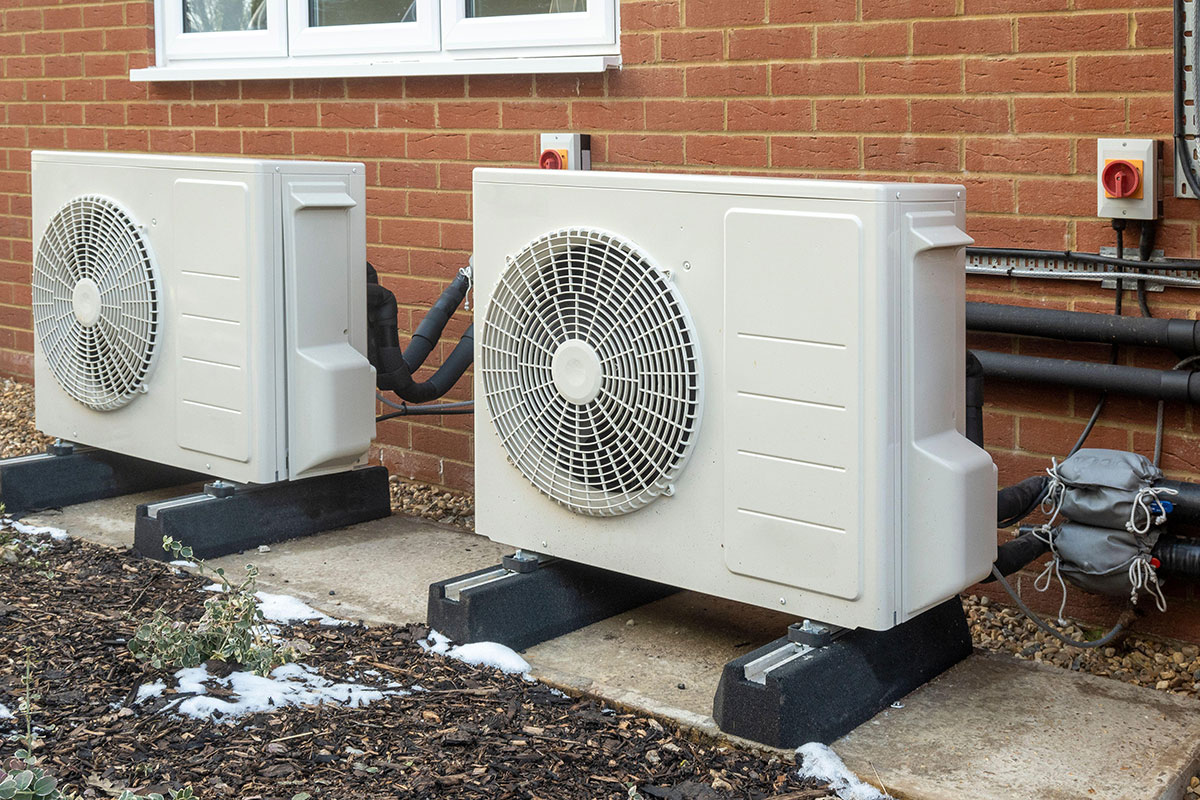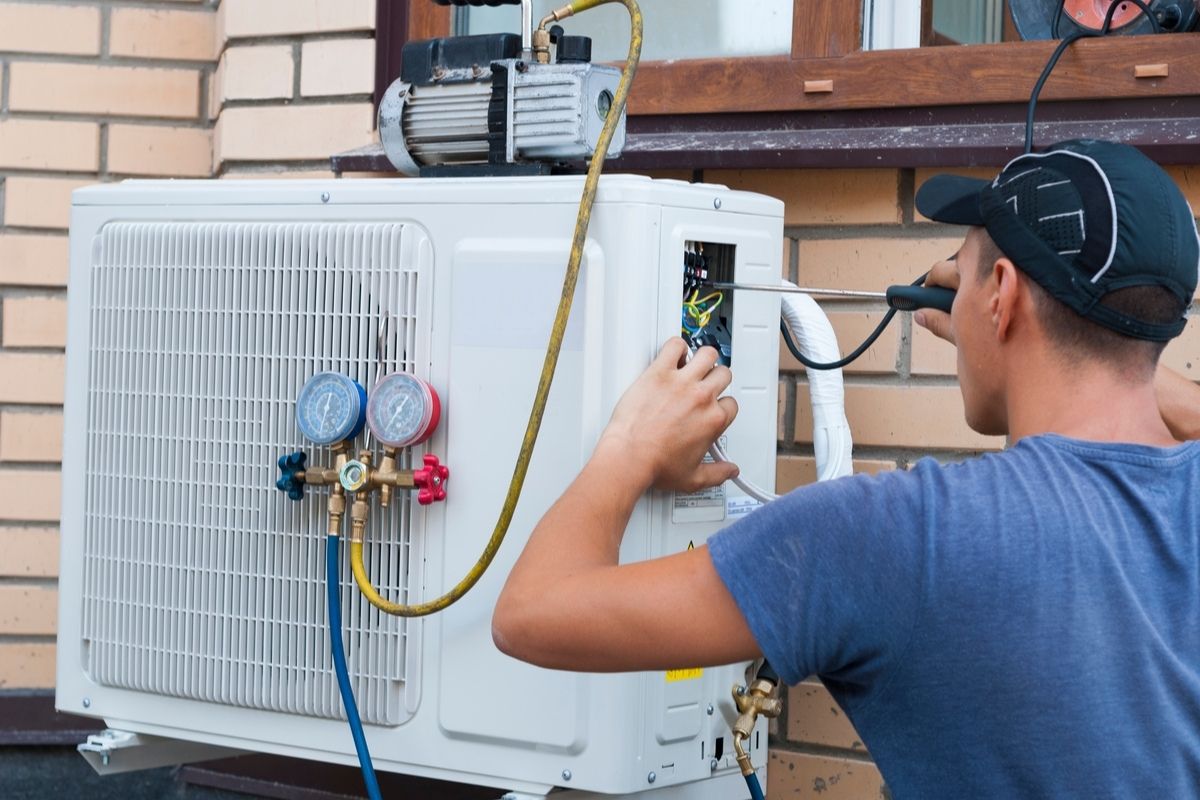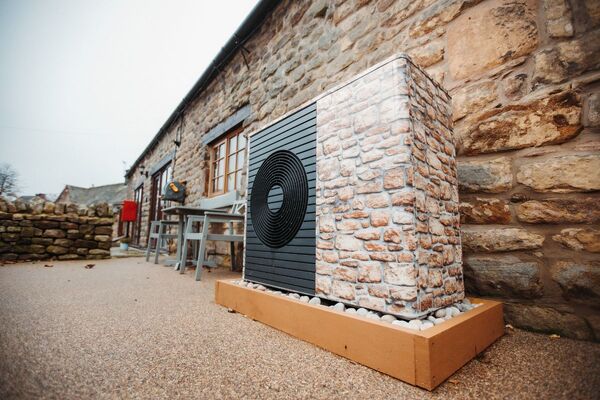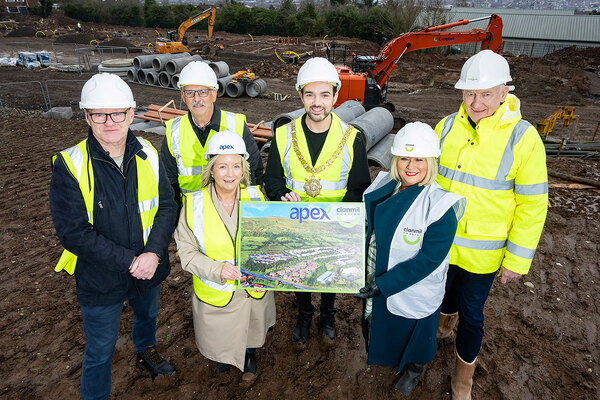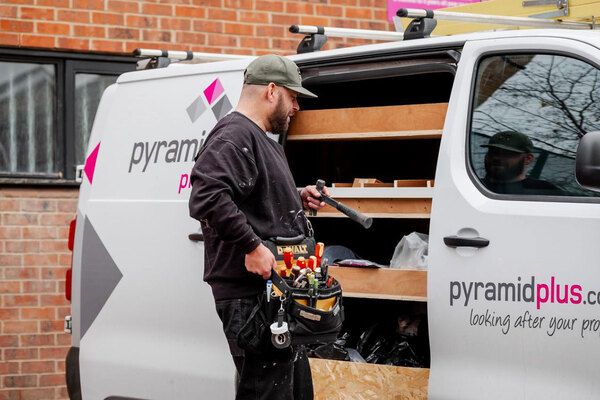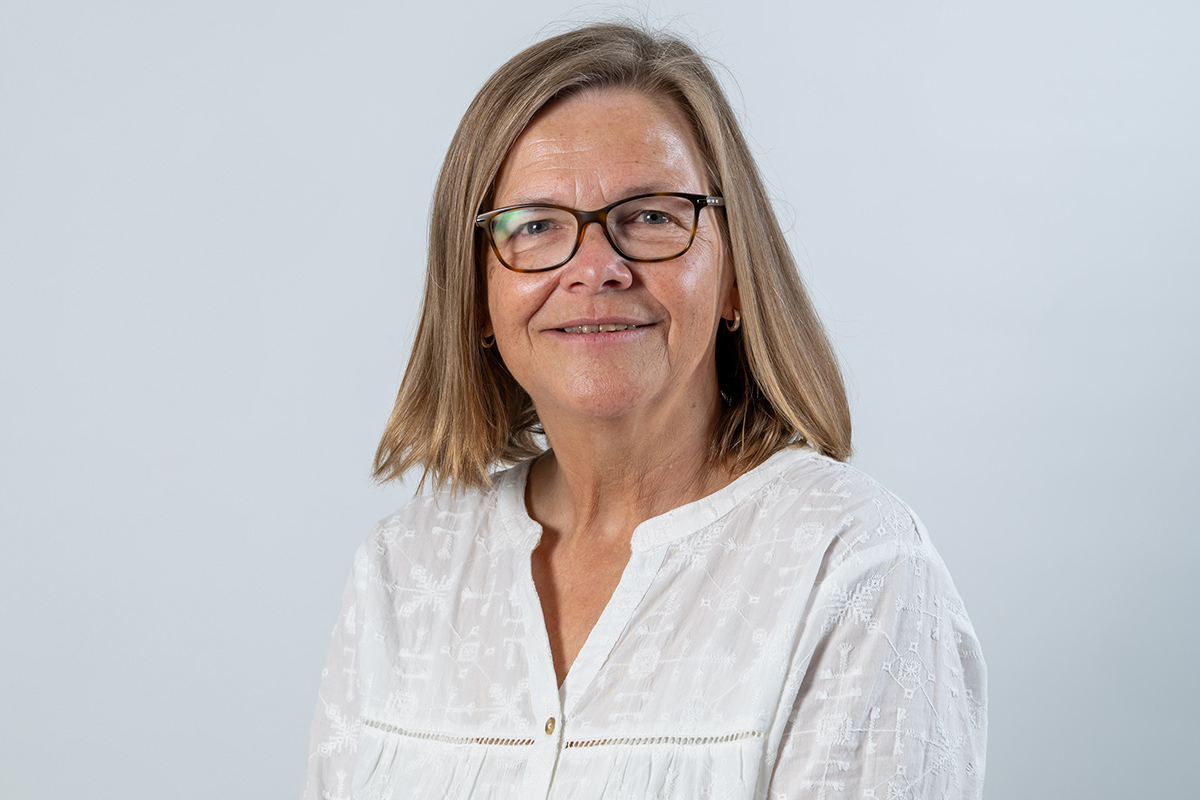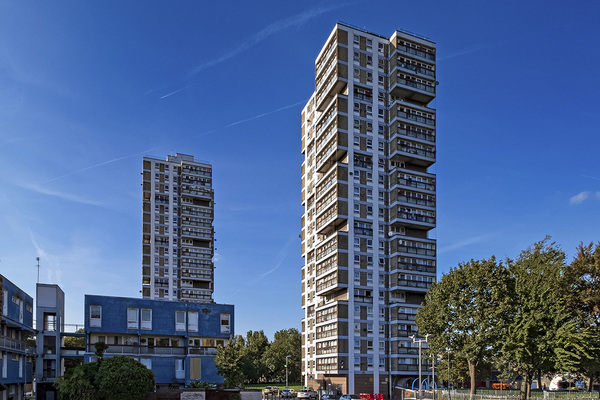You are viewing 1 of your 1 free articles
The landlord that has stopped installing gas boilers
The era of gas heating must come to an end, but most social landlords are only installing new low-carbon heating systems in new builds, or to replace oil and older electric heating systems. Alex King visits one housing association that has already started to take out gas boilers and replace them with heat pumps. Photography by David Oates
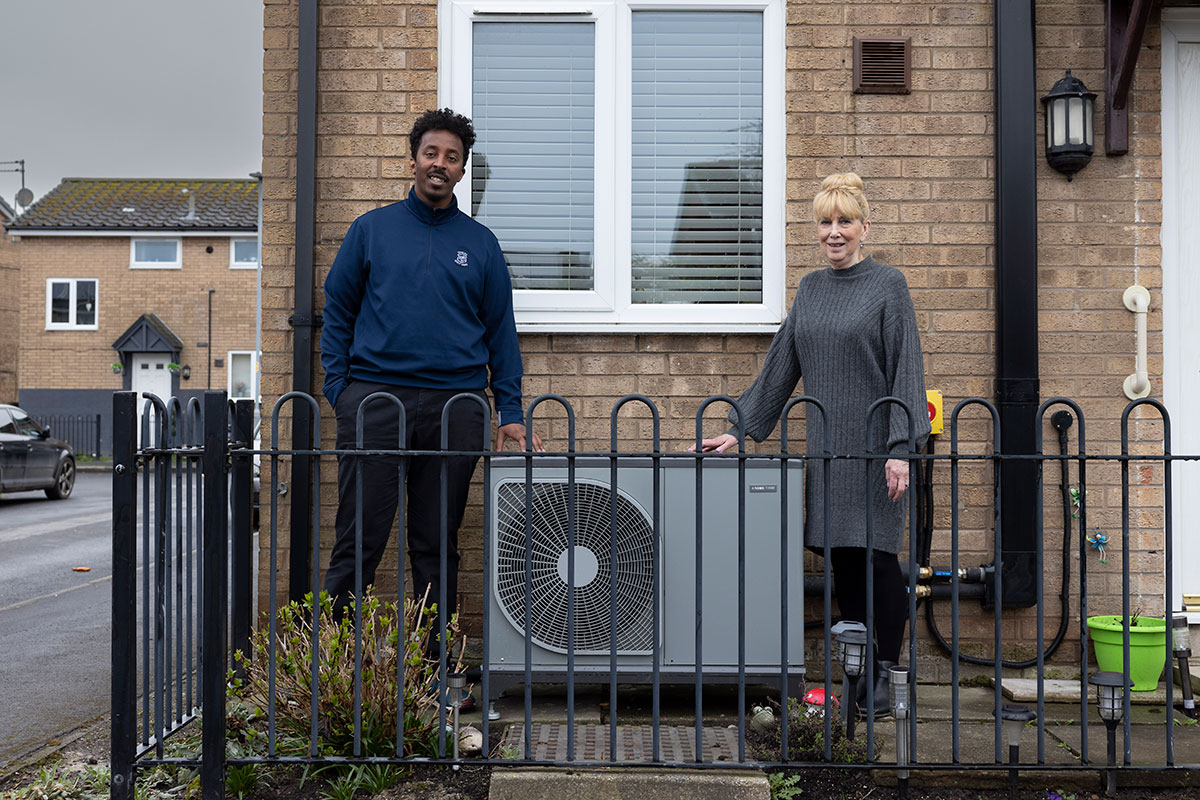
For 43 years, Rita Rothwell’s home had been heated with gas. Until now, that is. “My heat pump was installed in December,” she tells Inside Housing, as she sits cosily on her living room sofa. It is snowing outside, but the room is a toasty 18°C. “It is really nice heat, more so than the gas,” Rita adds. “It’s a different heat altogether.”
Rita lives on the Arrowfield Estate in the leafy Manchester suburb of Chorlton. Her home is one of 396 social houses having their gas boilers replaced with new air source heat pumps, as part of Southway Housing Trust’s multimillion-pound project to transform the way its homes are heated.
Having first had misgivings about her heat pump, Rita is now a champion of the technology, spreading the word across her community about the need for the change. “I’ve told people at the local bus stop that when their gas boiler breaks down, they’re going to have one of those heat pumps installed,” she says. “People don’t seem to understand that. They think they can get another gas boiler put in, but eventually we’re all going to have to have that heat pump.”
Heat pumps have been used in the social housing sector almost exclusively in new builds, or to replace costly old electric heating and oil heating systems, rather than replace gas boilers. Not so in Arrowfield, where Manchester-based social landlord Southway is taking the unusual step of replacing its old gas boilers with heat pumps as a matter of policy, to meet its climate commitments.
The government has a legally binding target to get the UK to net zero carbon emissions by 2050. With domestic heating accounting for 14% of UK greenhouse gas emissions, according to the Climate Change Committee (CCC), replacing gas heating systems with heat pumps has become a key tactic to reach this target. It is estimated that installing heat pumps could reduce households’ carbon footprint by up to 50%, when combined with other energy-saving measures like improved loft and cavity wall insulation.
The CCC published its progress report on the UK’s journey to net zero in June, and the report warned that the UK is well off its “pathway” in terms of installations of heat pumps. In 2022, the report says, 72,000 heat pumps were installed in the UK. This is far off what the committee had projected – 130,000 in 2022, rising to 145,000 this year. Writing on Twitter, CCC chief executive Chris Stark said: “We are bottom of the pile in installations per capita across Europe.”
Southway, though, has an ambitious net zero target. It wants its 6,300 homes to hit zero carbon by 2038. That is why it is taking action now, replacing old gas boilers like Rita’s with this new energy-saving technology that it believes is good for the climate, good for tenants and good for landlords.
Replacing existing boilers with heat pumps was an obvious solution. The government has already set a target of 600,000 heat pump installations a year by 2028 and has proposed a ban on the sale of gas boilers for most homes by 2035. The coming ban, and Southway’s own net zero goal, gave the landlord a new sense of urgency.
“We replace gas boilers every 15 years,” says Matt Roberts, its strategic director of property and development. “We have a commitment to be zero carbon by 2038. If we were to put gas boilers back in now, it would be 2038 by the time we replace them again.”
Southway believes that as well as helping to reach net zero, heat pumps will be cost-effective for tenants in the long run, not least because of rising energy costs. “You’re futureproofing your stock,” says Mr Roberts. “Gas is likely to become more expensive, while electricity is likely to become cheaper.”
The Arrowfield project is still in its infancy. So far, Southway has completed installation in 40 of the estate’s 396 homes. But as one of the most ambitious domestic renewable energy programmes in the country, it offers important lessons for other landlords that are set to embark on their own net zero journey. The first of those lessons is having good leadership. Buy-in from the top has been crucial for Southway’s strategy towards becoming a zero-carbon organisation in the next 15 years.
“The board had been through the Carbon Literacy Project,” chief executive Karen Mitchell explains to Inside Housing, referring to a one-day training programme offered by the Carbon Literary Project. “When we started targeting resources to achieve our carbon targets, that commitment was there.”
The commitment of Manchester’s municipal leaders to zero carbon has also been a huge boost in getting the project off the ground. “Manchester City Council set its 2038 net zero target in 2018 and the Greater Manchester Combined Authority in 2019,” says Ms Mitchell. “That was the context when we created our strategy that year – pushing it as much as we can.”
The second lesson was to understand the scale of the problem of carbon emissions. Southway commissioned an assessment of its estate in 2018-19 which found that Arrowfield was generating 32,000 tonnes of carbon emissions every year, 99% of which came from fossil fuel heating systems. “Suddenly we thought, ‘OK, that shows what we need to focus on,’” Ms Mitchell recalls.
The ambition was there, and the strategy and technology, too. But replacing gas with heat pumps does not come cheap. Southway calculated that it would need £140m in investment – almost doubling its 30-year stock investment programme of around £210m.
While there are funding opportunities to help mitigate the costs, Mr Roberts believes a third lesson for social landlords is to accept the need to invest. “You will have to fund some of it through your own capital programmes,” he explains, “while doing your best to combine measures at the same time to reduce costs.”
The Arrowfield project qualified for the European Regional Development Fund, which awarded £1.95m in matched funding. Southway also agreed a £120m private placement in 2021 to help it achieve its targets across its environmental, social and governance work, as well as securing £1.96m from the government’s Social Housing Decarbonisation Fund (SHDF). Although the SHDF money and private placement are more targeted at the remainder of Southway’s stock, they may support additional measures on Arrowfield.
Costs may pose one barrier. Another potential barrier for social landlords to overcome is infrastructure. For estates like Arrowfield – built in the 1970s when demand for electricity was much lower – the energy infrastructure was not powerful enough to meet the energy needs of the soon-to-be-installed heat pumps.
To resolve this issue, Southway collaborated with the district network operator (DNO) Electricity North West (ENW) to upgrade the local power network.
“We would urge other social landlords to engage early,” Mr Roberts says. He is confident the landlord’s experience will mean DNOs in other regions are now engaging with the housing sector to meet the demand for heat pumps. “The learning from this project has allowed the DNO to streamline its processes for multiple installs,” he says.
Connecting to the grid
Work began last January to ‘unloop’ the estate’s energy supply, giving each home an individual point of access to the grid, rather than being ‘looped’ together on a single service cable. The funding for the upgrade has come from ENW. Not all heat pump projects will require unlooping. But ENW advises social landlords to discuss unlooping with their DNO at the earliest opportunity.
These changes need to be communicated, and timing is key. “Housing associations will have to ensure there is a sensible gap between any unlooping or network upgrades and heat pumps being installed,” says Mr Roberts. “Work to the network or unlooping may be done well in advance on any installations, so it is vital that there is clear communication. Early engagement is important, however by the time you install a heat pump in tenants’ homes months later, they may have forgotten all about it and you will be back to square one.”
In numbers
14%
Proportion of UK greenhouse gas emissions from domestic heating, according to the Climate Change Committee
72,000
Number of heat pumps installed in the UK last year, according to the Climate Change Committee
Alongside infrastructure, Southway had to consider planning restrictions. Whereas installing heat pumps on the houses was deemed permitted development, the social landlord says it needed permission to install them on the flats. “We are still in discussion on a small number of flats, and a decision is expected soon,” Mr Roberts tells Inside Housing.
Southway has found that when it comes to replacing gas boilers with heat pumps, tenant education is crucial because heat pumps work totally differently, and not just for unlooping and upgrading the network.
“Gas boilers heat to higher temperatures,” says Joshua Emden, a research fellow at the Institute for Public Policy Research. “Where you might turn a gas boiler on in short blasts, you run a heat pump constantly.”
Southway advises social landlords to show tenants how to control their heating differently. “You need to bring people on your journey,” Mr Roberts advises. “Arrowfield Low Carbon Living is not just a heating replacement programme – it is a heating engagement programme.”
To help educate tenants, in 2022 Southway transformed an empty property at Arrowfield into a hub staffed by a community engagement officer ready to answer tenants’ questions. “It is a case of being honest and asking, ‘What’s your fear? How can we mitigate that?’” says Abdi Ali, the officer who looks after the hub and supports tenants in getting the advice they need.
Mr Ali’s message to tenants is that it is better to get their heat pump installed sooner rather than later, while the team is on site and ready to go. “It will be harder to get the system installed when their boiler fails several years down the line, where they will have to wait for us to buy a unit and book someone in to install,” he says.
Unsurprisingly, many of the concerns that tenants bring to Mr Ali are around whether their energy bills will go up. Rita saw a big initial jump in her electricity bill, partly because of rising energy costs across the board, and partly because heat pumps work less efficiently when they are first installed. Her monthly gas bill, however, went down.
Honest and open conversations with officers like Mr Ali can allay those concerns. “You have to explain that the system works in such a way that there is a jump in usage in terms of kilowatts when the pump is first turned on. But once it gets up to the temperature you set it to, it turns on to a more efficient system,” he says.
A combination of ambition, investment, leadership and community engagement means Southway’s Arrowfield project is helping to create a green future for the UK’s social housing sector. “We’ve got to do something and we’ve got to do it now,” says Mr Ali. “If we can do little steps like this, we can hopefully inspire people to go green themselves.”
Sign up for the IH long read bulletin
Already have an account? Click here to manage your newsletters

